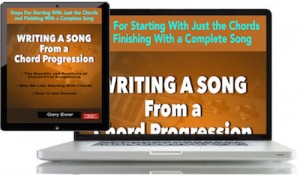If you’re looking to become a better songwriter, don’t forget about improving your ear. Being able to identify chords, rhythms and melodies by ear is helpful in two major ways:
- It speeds up the songwriting process. You may have a certain chord or melody note in your mind but may not have the ability to identify it. A weak ear means you have to experiment at your keyboard or guitar until you stumble on what you’re hearing, and that can take time.
- It gives you a larger collection of chords and other musical structures. When you hear interesting things happen in someone else’s song — things that you think you might be able to adapt to your own songs — you can identify them and they become part of your own personal musical vocabulary.
And of course, don’t forget how important a good ear is if you’re playing in a band. It allows you to pick up more easily on what your bandmates are playing, and then you’re set to contribute your own ideas.
 If you like starting songs by working with a chord progression, you need to read “Writing a Song From a Chord Progression.” It will give you the pros and cons of this songwriting method, and help you create songs that really work!
If you like starting songs by working with a chord progression, you need to read “Writing a Song From a Chord Progression.” It will give you the pros and cons of this songwriting method, and help you create songs that really work!
There are ear training programs out there, and all you have to do is Google them. Be careful though — some cost a lot of money, and though you may see amazing claims from the various creators of these programs with regard to how much they’ll help, everyone is different.
There is no magic pill to having a better ear. Some have a good ear that came about because of early childhood exposure to music and excellent early teaching. Others (even some excellent professionals out there) have an ear that needs constant work.
In any case, there is no getting around this important point: improving your ear takes time. Like songwriting itself, be prepared to work at it daily.
Sometimes the Best Ear Training is Free
One of the best exercises you can do — an exercise that makes the quickest advancement — is to transcribe melodies from recordings available online. If you have even just a rudimentary ability to write musical notation down on staff paper, listening to melodies and then slowly getting them down on paper is a powerful ear training exercise.
The process is simple. If you’re trying to improve your ability to transcribe melodies, try this:
- Use an instrument you feel comfortable with, either a keyboard or guitar. If you’re using your guitar, tune it before starting; for most recordings the players will be at a standard A440 concert pitch. If the recording you’re transcribing is slightly sharp or flat, tune to the recording before starting.
- Choose a simple recording. Something slow with relatively simple harmonies is best.
- Play the first few seconds of the song, and sing the melody notes you’re trying to identify.
- Write down the notes. If you know the rhythm, try to be as accurate as you can. If you’re not sure how to notate the rhythm, don’t worry about that yet. Just get the notes down.
- Move on to the next few melody notes.
- Once you’ve got an entire verse or chorus notated in this way, go back to the beginning of the song. Sing and play along with the recording.
Try to make this an almost-daily exercise. In fact, if you’re really serious about developing your musical ear, you should make this kind of musical transcription exercise part of your daily songwriting.
You can do the same process to identify chords, of course.
You don’t need anything more than a low, rudimentary level of music theory in order to be able to write notes on a musical staff. If you feel that you need some kind of help with that, my online store has a video-based music theory course that will help you, and so you may want to check that out.
Having a good musical ear and being able to identify musical elements by ear is not just some kind of party trick. It’s a vital part of being a well-rounded musician. If you’re hoping to be a professional singer-songwriter, it’s absolutely vital.
And though it may seem daunting, you’ll find that transcribing music is a very good way to start the process of developing your musical ear. It costs nothing, and with every song you transcribe you’ll see the benefits.
 Written by Gary Ewer. Follow Gary on Twitter
Written by Gary Ewer. Follow Gary on Twitter
 Thousands of songwriters are using “The Essential Secrets of Songwriting” eBook bundle to polish their songwriting technique. Every aspect of how to make a song better is covered. Stop wasting time — take your songwriting technique to a new level TODAY. Ten eBooks, plus a free one: $37 USD (Immediate download)
Thousands of songwriters are using “The Essential Secrets of Songwriting” eBook bundle to polish their songwriting technique. Every aspect of how to make a song better is covered. Stop wasting time — take your songwriting technique to a new level TODAY. Ten eBooks, plus a free one: $37 USD (Immediate download)










